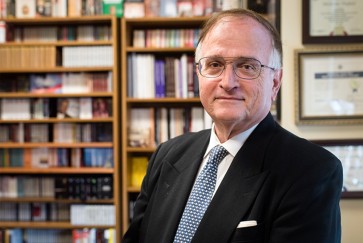Northwestern University professors Luisa Iruela-Arispe, Teri W. Odom, Murali Prakriya and Linda A. Teplin have been selected 2022 fellows of the American Association for the Advancement of Science (AAAS), the largest general scientific society in the world.
The 2022 class of AAAS Fellows includes 508 scientists, engineers and innovators spanning 24 scientific disciplines, recognized for their scientifically and socially distinguished achievements.
AAAS Fellows will be celebrated in Washington, D.C., in summer 2023.
“AAAS is proud to elevate these standout individuals and recognize the many ways in which they’ve advanced scientific excellence, tackled complex societal challenges and pushed boundaries that will reap benefits for years to come,” said Sudip S. Parikh, CEO of AAAS and executive publisher of the Science family of journals.
Luisa Iruela-Arispe
Luisa Iruela-Arispe is the chair of Cell and Developmental Biology and the Stephen Walter Ranson Professor of Cell Biology at Northwestern University Feinberg School of Medicine. She has published more than 200 peer-reviewed articles about signaling pathways that regulate vascular morphogenesis and vascular dysfunction in diseases and is recognized as a leader in the field of vascular biology.

Vascular biology focuses on blood vessels, including arteries, veins and capillaries through which blood flows. Iruela-Arispe’s lab has clarified the signals that control vascular expansion during development and regeneration during disease. She also contributed to the discovery that blood cells bud out of specific vascular cells in the embryo and demonstrated the mechanisms by which genetic defects in vascular cells give rise to liver failure and congenital heart problems in Alagille Syndrome.
Mentorship is an important component to Iruela-Arispe’s career, and she has trained 21 Ph.D. students and 24 postdoctoral fellows in her laboratory. She especially values mentoring women and individuals from underrepresented populations, seeing it as part of her personal mission to do what she can to increase representation in the sciences.
Teri W. Odom
Teri W. Odom is the chair of Northwestern’s chemistry department and the Joan Husting Madden and William H. Madden, Jr. Professor of Chemistry in the Weinberg College of Arts and Sciences and professor of materials science and engineering at the McCormick School of Engineering. She also is a member of Northwestern’s International Institute for Nanotechnology and the Chemistry of Life Processes Institute.

Odom is an expert in designing structured nanoscale materials with exceptional optical and physical properties. She and her research group have made precious metals more precious by tuning the size and shape of noble metals at the nanoscale; the group also has been able to transform ordinary materials into extraordinary ones by controlling their architectures over multiple length scales.
Odom has pioneered a suite of multiscale nanofabrication tools that can produce functional nanostructures with applications in photonics, sensing and nanomedicine. Examples include nanoparticle lattices that can manipulate light at the nanoscale and facilitate the design of plasmon-based nanoscale lasers and smart hybrid materials as well as hierarchical wrinkles that can control wetting. Odom also has designed nanoconstructs for single-particle imaging and whose shape can influence biological interactions. She is currently the editor-in-chief of Nano Letters, one of the first journals dedicated to nanotechnology.
Murali Prakriya
Murali Prakriya is the Magerstadt Professor of Pharmacology and Medicine at Feinberg. He is a leader in the field of cellular calcium signaling and its role in human disease.
Calcium ions act as a universal second messenger throughout the animal kingdom, controlling a range of cellular processes. Aberrant calcium signaling is linked to a growing list of human diseases including allergies, asthma, heart disorders, cancer and myriad neurodegenerative and brain disorders.

Prakriya helped identify a family of calcium ion channels called store-operated Orai channels, which are critical for immune cell function and host defense. Following up on this discovery, Prakriya led a decade-long effort to determine the mechanism of Orai channel gating — how channels open and close — which has broadly laid the foundation for understanding how Orai channels are controlled to permit cellular calcium entry.
Prakriya's work has produced important insights on the physiological roles of Orai-mediated calcium signaling for brain and immune functions including cognition, learning and memory, and their alterations in disease states.
Prakriya is a highly regarded mentor and received the Dean’s Teaching award in 2016 and 2022.
Linda Teplin
Linda Teplin, (Ph.D. ’75) is vice chair for research in the Department of Psychiatry and Behavioral Sciences, the Owen L. Coon Professor of Psychiatry and Behavioral Sciences, and professor of medicine in the division of infectious diseases at Feinberg.

For the past four decades, Teplin has led the Northwestern Juvenile Project, the first large-scale longitudinal study of health needs and psychiatric disorders in incarcerated females and males, examining both adults and juveniles.
In this ongoing project, Teplin’s team tracked and interviewed 1,829 youth who were initially arrested and detained between 1995 and 1998. Teplin has published multiple landmark studies, which have centered on the criminalization of psychiatric disorders, substance abuse, child maltreatment, trauma and suicidal ideation.
Teplin and her collaborators are now conducting a follow-up to the Northwestern Juvenile Project, during which investigators will interview the children of individuals tracked during the original study. Once completed, it will be the first-ever intergenerational prospective study of a correctional population.
Currently there are few methodologically rigorous studies of health needs and outcomes of incarcerated populations. Teplin addresses health disparities, especially those in minority populations.

